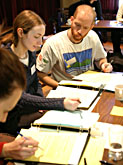Tomlinson workshop: Putting the teacher in T.A.
Tomlinson workshop: Putting the teacher in T.A. McGill University
User Tools (skip):
Tomlinson workshop: Putting the teacher in T.A.
Think of a positive learning experience you've had — anything from a high school physics lab to a contemporary dance lesson. Write down at least five elements that made it such a good experience. (Did you work alone or with others? Did the teacher link the new knowledge to prior knowledge? Were you given opportunities to apply the content?) Have a colleague do the same exercise. Now compare notes. What are some of the elements in common?

Science TAs Tricia Markle and Alex Smith
Owen Egan
This activity kick-started the Tomlinson Science Teaching Development Workshop, offered to graduate students in the Science Faculty. Designed by graduate students, for graduate students, the workshop aims to get students thinking about how people learn, and to give them some concrete tools and strategies for teaching or working as teaching assistants (TAs).
"If you continue in the academic world, teaching is a major pillar in building your profession," said participant Alex Smith, currently finishing his PhD in biology. "But you can easily escape taking any kind of formal instruction in teaching." He's particularly interested in how to address different learning styles. "I know what works for me — but that represents only a small percentage of people in the classroom. I want to be equipped to teach the people who are not like me."
The workshops are an initiative of the Tomlinson University Science Teaching Project, established in July 2002 to support the development of better teaching methods for university science students. "We know from the education literature that very often, when a young faculty member begins their career as a teacher, their ideas about teaching are formed very much by their own personal experience," says project director and physics professor Richard Harris. Ultimately, he hopes to get new faculty members "to ask themselves the right questions, so that teaching is something that they think about in a structured way, instead of just on the basis of how they were taught."
Last year, four graduate students were selected as Tomlinson Teaching Fellows. After taking the course "Teaching and Learning in Higher Education," offered by the Faculty of Education, they worked with Laura April McEwen, educational technologist and professional associate with the Tomlinson Project, to develop a workshop for their peers. It was piloted last fall. This year, four new teaching fellows took up the relay, giving the workshop last week to two groups of 20 graduate students.
Rose Matousek, who is doing a PhD in clinical psychology, has found leading the workshop extremely rewarding. "It's wonderful to be able to share my new knowledge with other people, and to see how they also get excited and impassioned about it." The experience has also radically changed the way she would go about TA-ing a course. "It's made me much more aware of what my students are like, what their backgrounds are and what my goal is as a teacher."
The workshop is given in three half-day sessions. In session one, participants link educational theory to their own experiences as learners. Then they're introduced to an instructional design model they can use to prepare for a class, which includes analyzing the content, developing learning outcomes and selecting appropriate teaching strategies. Session two looks at how to use questions to promote the active involvement of students, as well as how to respond to students' questions. Participants then examine how to manage problem sets and discussions in large classes. Session three focuses on grading and giving feedback.
The workshop facilitators practice what they preach, modelling teaching strategies such as using questions, examples, small group discussions and study moments. At the end of each session, participants are asked to fill out an evaluation form. Not only will this information be used to improve the workshops, but "it underlines the importance of getting feedback about your teaching so that you can improve your performance," said McEwen.
The next series of workshops will most likely be held in the fall. For more information, visit www.tomlinsonproject.mcgill.ca.
